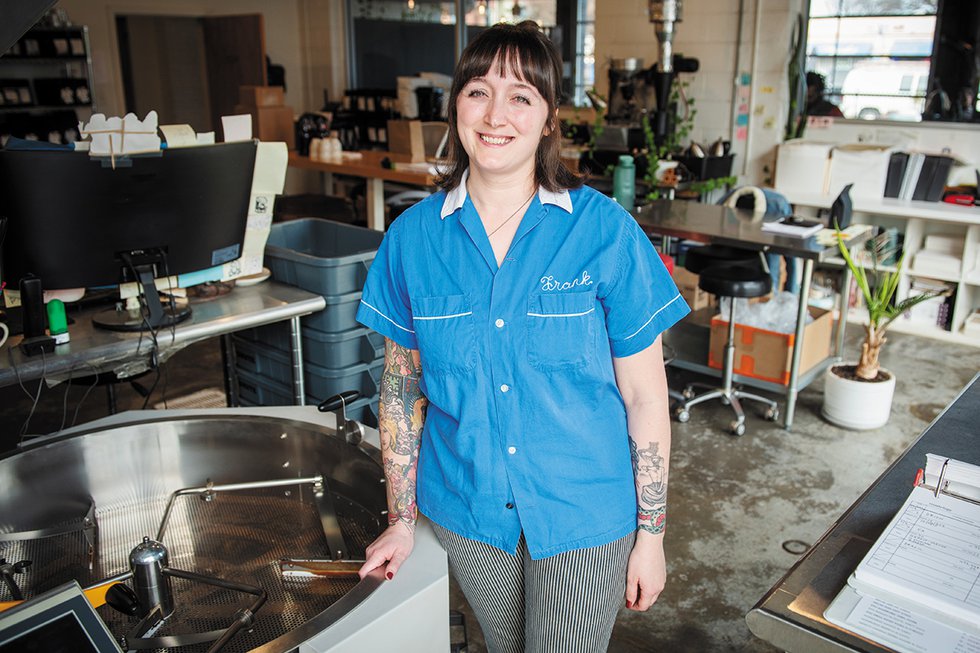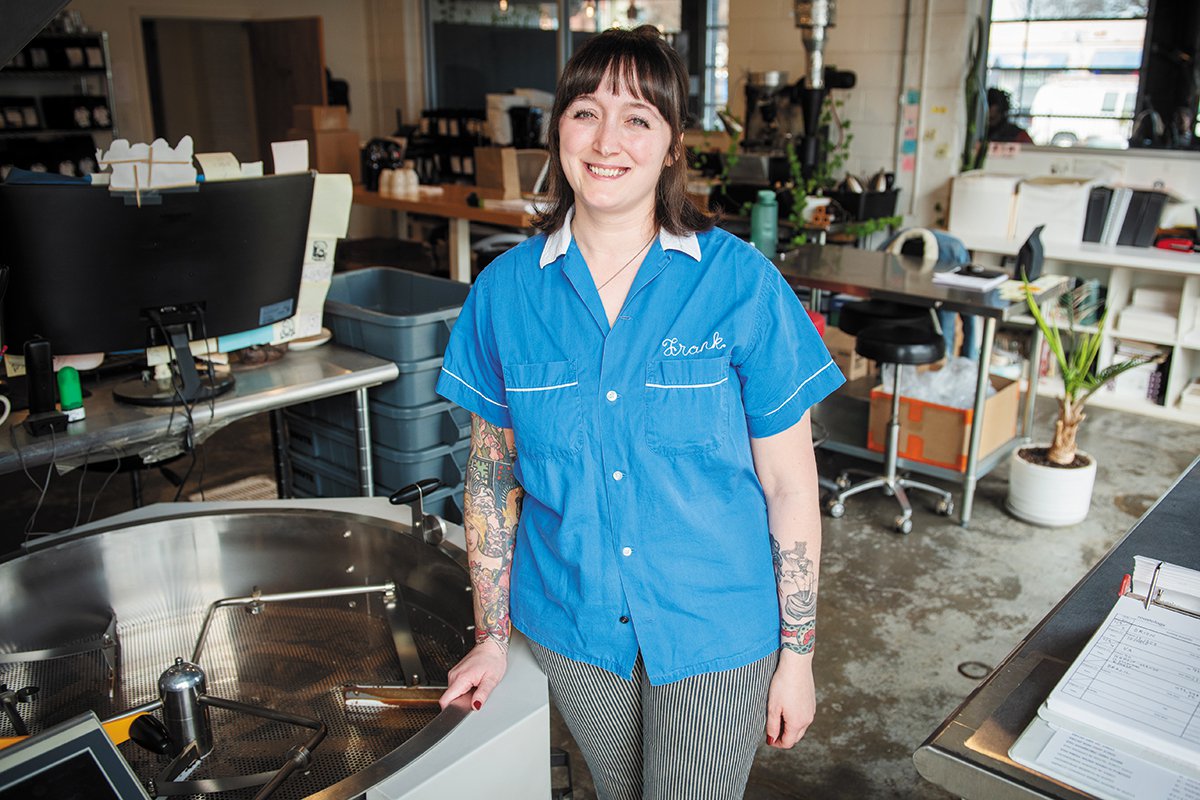
Julius Delacruz
Co-owner of Afterglow Espresso Cooperative (1719 Summit Ave.)
Julius Delacruz was on a nine-month journey to South America in 2016 when, out of the nook of his eye, he caught a glimpse of one thing acquainted. At a espresso store in Medellin, Colombia, 2,000 miles from Richmond, Delacruz noticed an individual carrying an Ardent Craft Ales T-shirt. Small world. He struck up a dialog with the person, who turned out to be Blanchard’s Espresso Roasting Co. founder David Blanchard. He didn’t comprehend it on the time, however upon returning to Richmond, Delacruz would go to work for Blanchard at every of his space cafes.
“What conjures up me about espresso is the connections,” Delacruz says. “A few of my closest buddies are co-workers from Lamplighter, Blanchard’s and now Afterglow.”
Delacruz helms the employee-owned Afterglow Espresso Cooperative in Scott’s Addition that took over the previous Lamplighter area (the house owners are all alumni) on Summit Avenue. The Jacksonville, Florida, native began within the trade as a dishwasher, fell in love with the world of espresso and finally labored his manner as much as grow to be a barista.
Along with his position as a barista and co-owner, the 33-year-old serves as graphic designer, content material creator and social media supervisor at Afterglow. Add to that listing product improvement — Delacruz created a espresso focus that’s used behind bars throughout town, together with Virago Spirits, The Jasper, Cobra Burger, Alewife and Brenner Go. “Baristas and bartenders have lots in frequent, so I’m glad that we every acknowledge higher substances, as a rule, yield higher outcomes,” he says.
Higher substances, particularly beans, are the spine of what the co-owners of Afterglow apply. The cooperative sources specialty espresso, which implies it scored over 80 factors on a 100-point scale, in accordance with the Specialty Espresso Affiliation.
“We purchase espresso that’s produced in smaller heaps from farmers that don’t develop business grade. … Oftentimes their rising practices exceed the {qualifications} of being ‘licensed natural,’” Delacruz explains. “This makes it dearer for us, nevertheless it’s vital to us to purchase rigorously grown espresso that’s distinctive, traceable, tastes good and [is] fairly inexpensive, all issues thought-about.” —Stephanie Ganz
Claire Millon
Head roaster at Riverbend Roastery (2623 E. Broad St.)
Barista and roaster Claire Millon, 34, first began brewing espresso whereas in highschool in her hometown of Lexington, Virginia, the place there was not a single Starbucks. She needed to transfer to Richmond for that, however when she did, she opted for independently owned retailers together with Crossroads Espresso & Ice Cream and Carry Espresso Store & Cafe. “It was at all times simply what I used to be going to do till I discovered what I used to be going to do,” Millon says. “After which 20 years go by, and I used to be like, ‘Oh, I feel I may be doing espresso. Espresso is what I do.’”
When the COVID-19 pandemic struck, Millon was pursuing one other curiosity, nannying, however with most kiddos at dwelling, Millon had little occurring. That left her out there when Liberty Public Home proprietor Alexa Schuett reached out to see if she could be interested by becoming a member of the opening group of Riverbend Roastery. Schuett debuted the Church Hill espresso store in 2021, taking up the previous Captain Buzzy’s (and briefly, Riverbend Espresso Co.) area.
As soon as the cafe was open and leaning into its new identification, Millon stepped again from her administration position to deal with her ardour, roasting. She was educated on the store’s getting older Probat roaster, which is older than she is. “It’s virtually like studying to drive on like an previous Worldwide truck with no energy steering and sort of screwy brakes,” she says, “as a result of now, if I ever use something newer, it’s gonna be straightforward breezy.”
The aged roaster, lovingly dubbed Zelda, calls for focus, and that’s simply advantageous with Millon. “I really actually admire that I really feel sort of nearer to the method,” she displays. “There’s a number of sounds and smells and nuances that I’ve discovered that I feel I wouldn’t usually concentrate on on one in every of these newer digital issues.”
Past roasting and brewing the proper cup of espresso, Millon is interested by breaking limitations across the beverage. She makes a distinction between sparse, single-origin espresso retailers she calls “third wave,” as in comparison with Riverbend’s “second wave,” model, which leaves room for flavored espresso drinks, one thing the brand new youngsters might be fast to dismiss as passe. So, Millon sought higher beans, selecting natural, fair-trade varieties with which to make the sort of sizzling and iced espresso creations the neighborhood regulars need of their mugs, boasting housemade syrups and daring flavors with dried spices comparable to cinnamon and nutmeg.
“I don’t assume espresso must be an elitist factor,” Millon says. “My most paramount philosophy is that I wish to create an area the place individuals really feel comfy, it doesn’t matter what they prefer to drink, as a result of it’s simply espresso.” —SG
Mary Doerr
Head roaster at Roastology (3015 W. Clay St.)
A neat row of porcelain white V60 espresso drippers stand like chess items on the counter at Roastology. Aromas of candy barley, blueberry and mocha tickle the air with a fruity, woody scent. Aside from the faucet of fingers hitting keyboards and water hissing by espresso grounds, the store is quiet. A barista takes my order, then masses a pour-over with house-roasted, anaerobic pure Ethiopian Gera, which drips strawberry notes by my cup of morning magic.
“I used to be one in every of three baristas when Dan [Allen, owner of Roastology] began out in Midlothian [under the name Adbibo] in 2013,” says head roaster Mary Doerr.
“Again then, we weren’t within the grocery shops, and we needed to get our espresso within the door at native eating places. One of many different baristas was our baker. I used to be the espresso particular person. As we began getting off-premises placements, Dan wanted assist roasting. I needed to study.”
Allen and Doerr bought their begin within the kitchen, utilizing dwelling roasting tools and one other frequent equipment — a popcorn popper. Air roasters are inexpensive, however they blow air round inconsistently. Now, the pair rely on drum roasters, which supply a extra fixed heating model. Doerr says the store’s “tried-and-true” machine is from Espresso-Tech Engineering, although she’s going to sometimes air roast smaller batches when making blends for native eating places comparable to Hobnob or Lolita’s. “Although not on a popcorn popper,” she says, laughing.
Working with distributors and immediately with espresso farms is Doerr’s key to consistency. She additionally cites in-house take care of the beans. “We retailer our beans in hermetic barrels which might be stored round 66 levels,” she says. From there, single origins are laid out for her to profile.
“Dan and I went to Vermont to espresso faculty [at Coffee Lab International] to proceed our training,” she says. “We spent 10 hours a day for every week studying new and completely different methods for roasting and conducting cuppings.”
Previous coaching has supplemented Roastology’s ethos of respecting the inherent nature and origins of the bean, a compass that guides Doerr. For the store’s Ethiopian Gera, she believes it calls for a lighter contact.
“I style all through the method and within the remaining roast to find out if it hits,” she explains. “I needed the Ethiopian Gera to style extra delicate, like a kind of Godiva chocolate cups with the berries in them. What we would like is a fruity sweetness with a depth of taste.” —Genevelyn Steele

